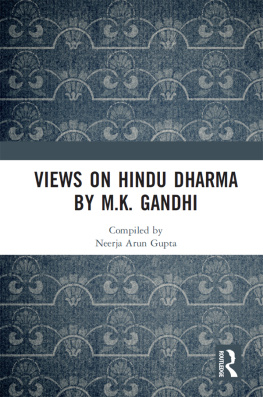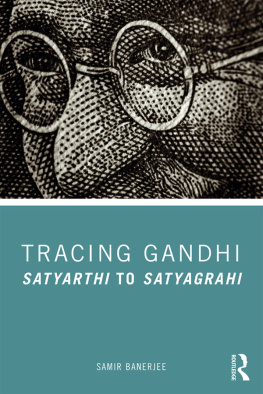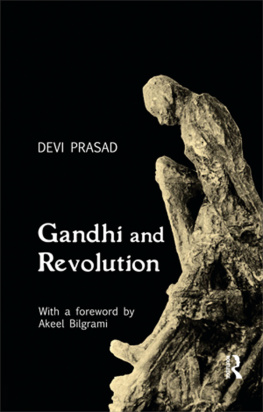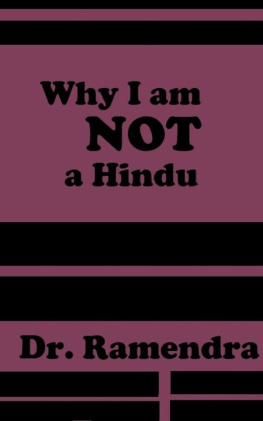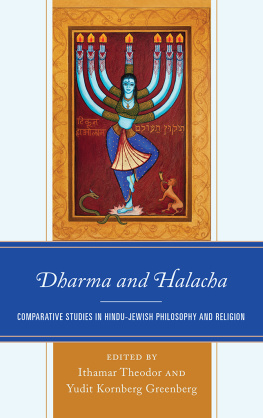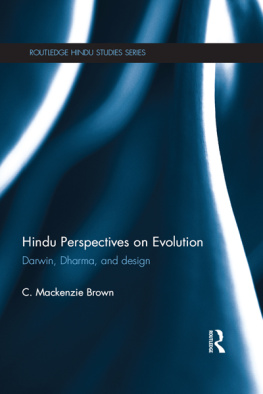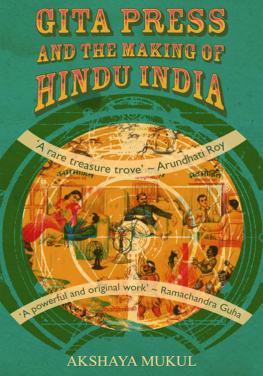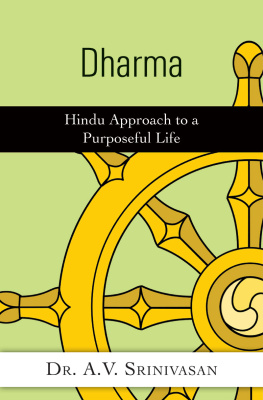
VIEWS ON HINDU DHARMA
Mohandas Karamchand Gandhi took pride in calling himself a Sanatani Hindu. He lived by what he professed. Indeed, he spiritualized his entire political existence and his very opinion, world view and discourse was weighted with morality and ethics born of Hindu Dharma.
This timely compilation of Mahatma Gandhis views on Hindu Dharma is a remarkable and systematically arranged compendium of his ideas on every aspect of Indias social and political life.
Gandhis views disseminated through many short essays in Harijan and other journals of his time on Sanatan Dharma, idol worship, Rama as a God, compulsory teaching of Gita in schools, conversion, cow-slaughter and protection, varnashramas, untouchability and other aspects are presented here in his own words.
This volume is indispensable for scholars of Modern South Asian History, Gandhian Thought, Colonialism and Religious Studies.
Neerja Arun Gupta is at present the Principal of Bharatiya Vidya Bhavans Sheth R.A.P.G. College of Arts and Commerce, Ahmedabad, and Syndicate Member of Gujarat University, Ahmedabad. She is also International Academic Chair for Global Organization of People of Indian Origin, U.S.A. as well as the Director of the Study Abroad Programme & Diaspora and Migration Research Center at Gujarat University, Ahmedabad. At present she is on the academic and administrative panels of sixteen International Universities and several Indian Universities, bodies and Public Service Commissions.
She is the Chief Editor of the International Journal of Indian Studies, Bharatiya Manyaprad, and major International publishers have published her 14 books and over 45 research articles on topics such as Gandhian Thought, Indian Poetics, Diaspora Studies, Indian Cultural Heritage and English, Sanskrit and Hindi Literature. She is the recipient of Shiksha Bharti Puraskar.
Views on Hindu Dharma
by
M.K. Gandhi
Compiled by
NEERJA ARUN GUPTA

First published 2018
by Routledge
2 Park Square, Milton Park, Abingdon, Oxon OX14 4RN
and by Routledge
711 Third Avenue, New York, NY 10017
Routledge is an imprint of the Taylor & Francis Group, an informa business
2018 selection and editorial matter, Neerja Arun Gupta; individual chapters, the contributors; and Manohar Publishers & Distributors
The right of Neerja Arun Gupta to be identified as the author of the editorial material, and of the authors for their individual chapters, has been asserted in accordance with sections 77 and 78 of the Copyright, Designs and Patents Act 1988.
All rights reserved. No part of this book may be reprinted or reproduced or utilised in any form or by any electronic, mechanical, or other means, now known or hereafter invented, including photocopying and recording, or in any information storage or retrieval system, without permission in writing from the publishers.
Trademark notice: Product or corporate names may be trademarks or registered trademarks, and are used only for identification and explanation without intent to infringe.
Print edition not for sale in South Asia (India, Sri Lanka, Nepal, Bangladesh, Afghanistan, Pakistan or Bhutan)
British Library Cataloguing in Publication Data
A catalogue record for this book is available from the British Library
Library of Congress Cataloging in Publication Data
A catalog record for this book has been requested
ISBN: 978-1-138-09549-6 (hbk)
ISBN: 978-0-203-71279-5 (ebk)
Typeset in Janson Text 11/13
by Kohli Print, Delhi 110051

Contents
Mahatma Gandhi was a man of God. India loved and revered him as Father of the Nation. While falling to the bullets of the assassin Nathuram Godse on 30 January 1948, he uttered Hey Ram! Hey Ram (O, Lord; O Lord); and if he had survived for a couple of minutes more, perhaps, he would have whispered: Lord, forgive them, for they know not what they do. Two days later The Pioneer, an English daily of Lucknow, published a sketch-presentation showing Jesus Christ at top-let corner and Mahatma Gandhi on the right-top corner with the caption The Cross moves East. How true!
Mohandas Karamchand Gandhi took pride in calling himself a Sanatani Hindu. He lived by what he professed. He said: My life is my message. Indeed, he spiritualized his entire political existence and his every opinion, view or discourse was weighted with morality and ethics born of Hindu Dharma.
Dr. Neerja Aruns compilation of Gandhijis view on Hindu Dharma is a remarkable and systematically arranged compendium of his ideas on every aspect of Indias social and political life.
Reading Part I, paper 3 God Is, I am reminded of the Spiritual Message of Gandhiji given by him on his UK visit for the Round Table Conference which was recorded by Columbia Broadcasting Corporation, England, and transcribed into a Gramophone Record which we possessed for several decades but in course of time got damaged/destroyed, hence no longer with me. The contents of the chapter include that recorded message I am simply thrilled at that. In Part II Why I am a Hindu, he asserts: Non-violence is common to all religions, but it has found its highest expression and application in Hinduism. Hinduism believes in oneness not merely of human life but in the oneness of all that lives.
In Part VII on Religious Education, he held that India will never be Godless, but religious teachers are hypocritical and selfish, that they (the Mullahs, Dasturs, Brahmins) will have to be approached and the energy which Indians have derived from English exucation, will have to be devoted to religious education. He said that he did not believe in State Religion as religion is a purely personal matter; but that did not mean that State Schools should not provide ethical teachings and Fundamental Ethics were common to all religions.
In Part XV Caste vs. Class, he asserted that casteism being repugnant to moral sense must be summarily rejected as contrary to the spirit of Vedas and to Fundamental Ethics. Referring to untouchability, he said that untouchability is no part of Hinduism, but Hinduism has sinned in giving sanction to untouchability. In this connection, he prescribed a beautiful test to judge a religion. He said: A religion has to be judged not by its worse specimens but by the best it might have produced; for that, and that alone, can be as the standard to aspire to, if not to improve upon it. Gandhiji had been a pragmatic and positive thinker, which is the need of our times.
It was the year 1920 when he wrote that caste is but an extension of the principle of the family; both are governed by blood and heredity. The spirit behind caste is not one of arrogant superiority; it is classification of different systems of self-culture the best possible adjustment of social stability and progress. Caste does not connote superiority or inferiority; it simply recognizes different outlooks and modes of life. However, a sort of hierarchy has been evolved in the caste system.
Under the heading Whose is the Himiliation dealing with Untouchability, and emphasizing that Caste is no part of Hinduism, Gandhiji wrote that Varna is not Caste but Class. A man may call himself a Brahmin, i.e. a teacher of religion if he is one in fact, a Kshatriya, i.e. a soldier if he is one, or a Vaishya, i.e. a merchant or farmer if he is that or a Shudra, i.e. an employee if he is one. These divisions are not Castes but Classes and have reference to callings; there is no such class as that of untouchables.
Next page
